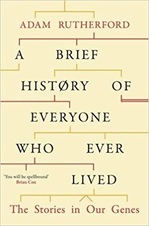
Today I’m sharing my review of A Brief History of Everyone Who Ever Lived – one of my rare forays into non-fiction.
This is a story about you.
It is the history of who you are and how you came to be. It is unique to you, as it is to each of the 100 billion modern humans who have ever drawn breath. But it is also our collective story, because in every one of our genomes we each carry the history of our species – births, deaths, disease, war, famine, migration and a lot of sex.
Since scientists first read the human genome in 2001 it has been subject to all sorts of claims, counterclaims and myths. In fact, as Adam Rutherford explains, our genomes should be read not as instruction manuals, but as epic poems. DNA determines far less than we have been led to believe about us as individuals, but vastly more about us as a species.
In this captivating journey through the expanding landscape of genetics, Adam Rutherford reveals what our genes now tell us about history, and what history tells us about our genes. From Neanderthals to murder, from redheads to race, dead kings to plague, evolution to epigenetics, this is a demystifying and illuminating new portrait of who we are and how we came to be.
A Brief History of Everyone Who Ever Lived is split roughly into two halves. The first half covers the history of homo sapiens – where we came from, how we spread to inhabit so much of the world, and what we did along the way. As this is a book about genetics, it looks at our history from the perspective of what DNA evidence can tell us about our past, using those few remains discovered in conditions permitting DNA to be recovered, as well as what our own DNA reveals about our history. The second half focuses more on where we are now, and what recent developments in what is still a relatively young science can, and perhaps more importantly, can’t tell us, and I found it to be an interesting read. Many of the ideas behind this are incredibly complex, but Rutherford explains things in such a way that they are understandable to those with little background knowledge on the subject.
I’m not going to go into the science at all – it’s not my area of expertise, and I’d only do it badly – but this book covers the history of the science as well as what that science can now tell us. And there are some wonderful parts of our history explained, such as our fraternisation with homo neanderthalenthis (we have, on average, approx. 3% Neanderthal DNA, so, you know, that came from somewhere), and our tolerance to lactose to name but two. There’s also a wonderful (if slightly gruesome) explanation of the bubonic plague, and exactly what caused the symptoms that are so well documented, and I found that to be extremely interesting.
Whilst the topic as a whole is fascinating, there were some wonderful little anecdotes included that I particularly enjoyed where DNA had, rightly or wrongly, been used to prove something or other. As an East Midlands gal, the exhumation of Richard III from a car park in Leicester a few years ago was local news. It was interesting to see this unfold from the perspective of the investigations that went into proving the identity of the remains. As a contrast, there was an example of a book published a few years ago purporting to have discovered the identity of Jack the Ripper via DNA evidence. One of these investigations was run with the utmost care and attention to detail and a thoroughness that leaves the result beyond doubt, the other… was not. Let’s just say there’s a reason I remember the Richard III story and not the other, despite them occurring at a similar point in time. 😉
A Brief History of Everyone Who Ever Lived is written in an extremely engaging style, and I loved the footnotes that were both helpful and often amusing (I still can’t get over the scientific name “ba humbugi” for a species of snail, or “gorilla gorilla gorilla” for a Western Lowland Gorilla found in Africa (it’s ok, he said I could laugh about this)). Rutherford makes the complex science behind these ideas accessible to the reader, and it’s wonderful to read a book that shouts about its topic whilst still being clear about its limitations. Recommended.
Sounds fascinating! I love when scientists are able to explain things in an accessible way for non-scientists to understand. Must add this one to the wishlist!
Absolutely! I liked his sense of humour too – made me chuckle a few times, which is unexpected with a book like this 😊
Fab review! My husband really enjoys Inside Science which the author presents on Radio 4 so I’ll be recommending this to him.
Thank you, Nicki! Hope he enjoys it 🙂
Sounds very interesting! My kind of thing and not too much waffle! X
It’s a fascinating topic, and I liked the author’s sense of humour!
Fantastic review Jo! Mr B has this book on his TBR but I might have to steal it off him, sounds absolutely brilliant! 😁
Thank you, Beth! I always find it difficult to review non-fiction, so I really appreciate your comment.
And it is so interesting, and brilliantly written – I can’t recommend it enough 😘